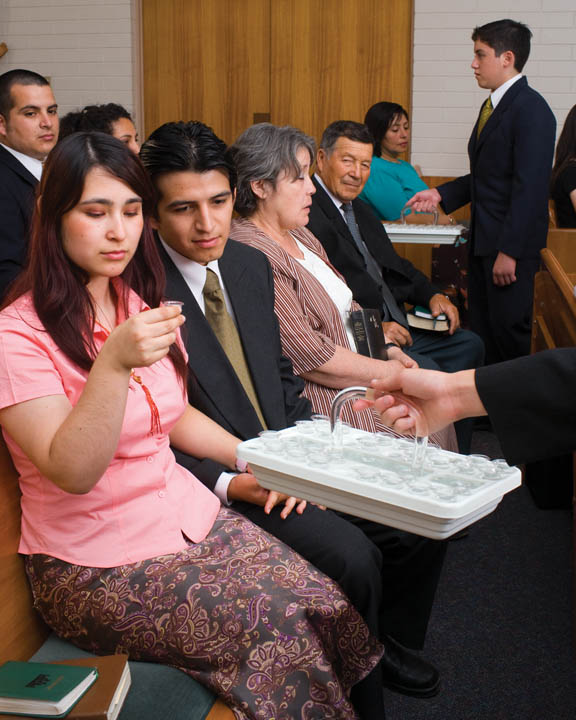Our greatest gift given is who we are.
The fact that God created us, His children, to be just like Him.
In Elder Jeffrey R. Hollands, " Of Souls, Symbols, and Sacramets," he speaks and addresses the young adults of the world, specifically those of the LDS belief, because of the dramatic impact that this body of people can have on the world, and in their life.
Holland addresses to us, because of how the subject appeals directly to the decisions we are forced to make. Above all, Holland focuses on our souls and the sacrament. Two very intimate, important, and sacred elements of our life.

The doctrine of Jesus Christ teaches us of the sanctity of sexual relationships within the bonds of marriage. This was taught from Adam and Eve, to our day in 2014. Holland wanted to explain this very point, how this act, which is so very sacred and holy is related to the sacrament.
When we partake of the sacrament, we make an offering to God, of all that we need to give up in order to abide by His commandments. We do the same in our relationship in marriage. We make an offering, to one another, not temporally but eternally.
Each week, we renew promise that was made only once before in our life at the time of baptism, but yet are privileged to remember this in every Sunday church meeting. In the same matter, we are sealed once, but can partake in the special opportunity to do ordinance work for the dead as often as possible.
The sacrament and unity in marriage are extremely and closely related. Holland uses this metaphor to help us gain a greater appreciation for the solemnity of this covenant and commandment.
In the same sense, we can not fulfill with the commandment of the Sacrament and creating human life, alone. Holland explains that the man and the woman were created for each other, and not meant to be alone. They are very one in the sense. The two must exist together. And to complete with God's purposes to bring about life.
Just like the Sacrament, we can not complete with this sacred ordinance alone. Spiritually we renew with our Heavenly Father, but physically we do it with a priesthood holder. This is a beautiful process, as it teaches us that we must be humble, to realize we can not do all things alone, we must rely on others, and together we can complete the purposes of God.
Holland uses metaphor and symbols to teach such an intimate and infinite principle that very much so applies to our physical and spiritual being.
The fact that God created us, His children, to be just like Him.
In Elder Jeffrey R. Hollands, " Of Souls, Symbols, and Sacramets," he speaks and addresses the young adults of the world, specifically those of the LDS belief, because of the dramatic impact that this body of people can have on the world, and in their life.
Holland addresses to us, because of how the subject appeals directly to the decisions we are forced to make. Above all, Holland focuses on our souls and the sacrament. Two very intimate, important, and sacred elements of our life.

The doctrine of Jesus Christ teaches us of the sanctity of sexual relationships within the bonds of marriage. This was taught from Adam and Eve, to our day in 2014. Holland wanted to explain this very point, how this act, which is so very sacred and holy is related to the sacrament.
When we partake of the sacrament, we make an offering to God, of all that we need to give up in order to abide by His commandments. We do the same in our relationship in marriage. We make an offering, to one another, not temporally but eternally.
Each week, we renew promise that was made only once before in our life at the time of baptism, but yet are privileged to remember this in every Sunday church meeting. In the same matter, we are sealed once, but can partake in the special opportunity to do ordinance work for the dead as often as possible.
The sacrament and unity in marriage are extremely and closely related. Holland uses this metaphor to help us gain a greater appreciation for the solemnity of this covenant and commandment.
In the same sense, we can not fulfill with the commandment of the Sacrament and creating human life, alone. Holland explains that the man and the woman were created for each other, and not meant to be alone. They are very one in the sense. The two must exist together. And to complete with God's purposes to bring about life.
Just like the Sacrament, we can not complete with this sacred ordinance alone. Spiritually we renew with our Heavenly Father, but physically we do it with a priesthood holder. This is a beautiful process, as it teaches us that we must be humble, to realize we can not do all things alone, we must rely on others, and together we can complete the purposes of God.
Holland uses metaphor and symbols to teach such an intimate and infinite principle that very much so applies to our physical and spiritual being.
